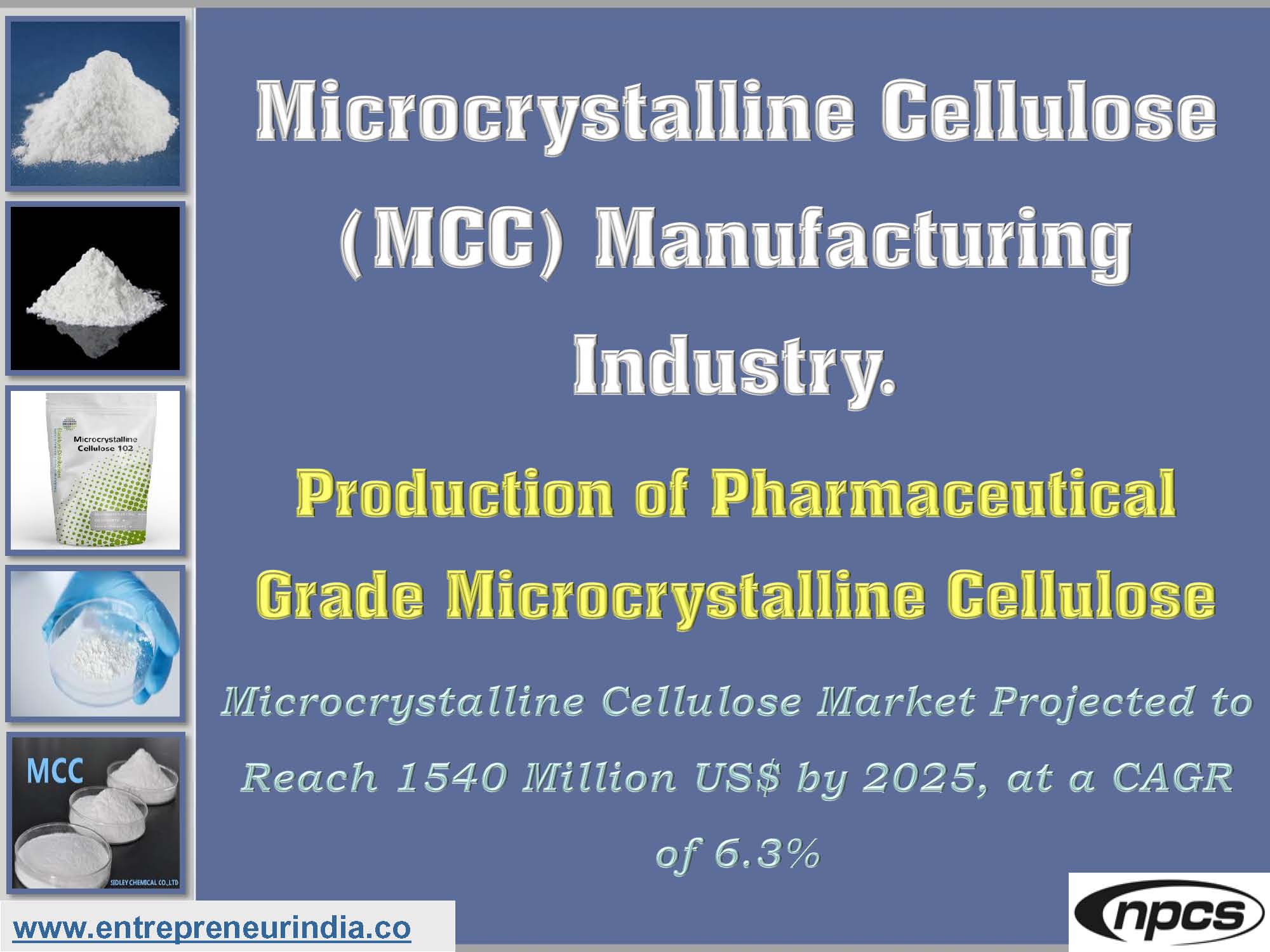
The Microcrystalline Cellulose (MCC) Manufacturing Industry has gained strong momentum as demand for safe, plant-based excipients and additives continues to rise. MCC is a refined cellulose powder widely used in pharmaceutical, food, and cosmetic formulations. It’s valued for its excellent binding, disintegration, and stabilizing properties. The production of MCC from wood pulp or cotton linters offers a viable and profitable business opportunity for entrepreneurs aiming to tap into the high-growth sectors of wellness, nutrition, and clean-label formulations. With demand booming in both domestic and international markets, the Microcrystalline Cellulose (MCC) Manufacturing Industry is a compelling investment sector.
Microcrystalline Cellulose Manufacturing Industry
Applications of MCC Across Industries
The Microcrystalline Cellulose Manufacturing Industry caters to multiple end-user sectors. In pharmaceuticals, MCC serves as a filler, binder, and disintegrant in tablets, ensuring optimal drug release and uniform distribution. In food applications, it acts as a fat replacer, anti-caking agent, and texture enhancer. Personal care products use MCC as a stabilizer in creams, powders, and lotions. The consistent demand across such diverse industries makes MCC manufacturing a strategically sound business. This broad market ensures stable demand for manufacturers targeting different sectors, including health, wellness, cosmetics, and food processing.
Raw Materials and Production Process
The primary raw materials for MCC include purified alpha-cellulose extracted from either wood pulp or cotton linters. The production involves acid hydrolysis, typically with dilute hydrochloric acid, to break down the amorphous regions of cellulose. The remaining crystalline regions are filtered, washed thoroughly, neutralized, and dried to form a fine white powder. The drying may be done using spray drying or vacuum drying techniques, depending on the desired particle size and moisture content. The Microcrystalline Cellulose (MCC) Manufacturing Industry prioritizes purity, consistency, and quality at every step to meet global standards.
Infrastructure and Equipment Needed
To establish a production unit in the Microcrystalline Cellulose (MCC) Manufacturing Industry, infrastructure such as acid-resistant reactors, filtration units, centrifuges, dryers, and grinding machines is required. Cleanroom facilities and proper ventilation systems are necessary, especially when producing pharma-grade MCC. A medium-scale unit typically requires 8,000 to 12,000 square feet of built-up area. Analytical equipment like moisture analyzers, particle size testers, and microbial testing labs are essential to ensure batch consistency and meet regulatory standards. Ensuring GMP compliance is a must if you plan to serve the pharmaceutical or export markets.
Investment and Profitability
The initial investment for a small to medium MCC manufacturing unit ranges from ?1 crore to ?3 crores, depending on automation, capacity, and compliance requirements. Machinery costs, building setup, working capital, licensing, and raw material procurement form the major cost heads. MCC is a high-value product, retailing between ?300 to ?800 per kg, depending on its grade. The Microcrystalline Cellulose (MCC) Manufacturing Industry offers healthy profit margins of 25–35% if consistent quality is maintained. With bulk contracts from pharma or nutraceutical brands, breakeven can be achieve within 2–3 years.
Legal Compliance and Certifications
To operate in the Microcrystalline Cellulose (MCC) Manufacturing Industry, a business must obtain:
-
Factory license
-
GST registration
-
Pollution control board consent
-
MSME/Udyam registration
-
GMP or WHO-GMP certification
-
ISO 9001 and ISO 22000 (for food-grade MCC)
-
FSSAI license (for food applications)
-
Drug license under Drugs and Cosmetics Act (for pharma MCC)
For export markets, certifications like US FDA, EU DMF, or COFEPRIS may be necessary. Ensuring complete documentation and quality assurance protocols is critical to building trust with B2B clients.
Target Customers and Sales Channels
The primary customers in the Microcrystalline Cellulose (MCC) Manufacturing Industry include:
-
Pharmaceutical manufacturers
-
Nutraceutical and supplement companies
-
Food and bakery processing units
-
Cosmetic and personal care brands
-
B2B bulk chemical distributors
-
Export houses serving North America, Europe, and the Middle East
Sales can be driven via online directories (IndiaMART, Alibaba, ExportHub), trade exhibitions (CPhI, FoodTech, PharmaTech), and direct partnerships. Offering product samples with technical specifications (COA, MSDS) helps build credibility.
Scope for Diversification and Expansion
There’s ample room to expand within the Microcrystalline Cellulose (MCC) Manufacturing Industry. Entrepreneurs can venture into producing colloidal MCC for suspensions, Croscarmellose Sodium for rapid disintegration, or enter contract manufacturing for formulation companies. Integrating vertically by sourcing raw cellulose from in-house or local sources can cut costs. Forward integration into tablet pressing, granulation, or pre-blended excipient packs adds more value. R&D investment to customize MCC grades (based on compressibility or solubility) will differentiate your brand and increase profitability.
Final Thoughts
The Microcrystalline Cellulose (MCC) Manufacturing Industry is positione at the intersection of innovation and essential industry demand. Its applications across pharma, food, and cosmetic segments ensure strong business fundamentals and diverse income sources. With growing demand for clean-label, vegan-friendly, and inert excipients globally, MCC will remain a staple in manufacturing. Entrepreneurs who focus on compliance, quality control, and branding can carve a successful niche. Whether you aim to supply to top pharma brands or enter the nutraceutical export market, MCC manufacturing is a high-potential, future-proof business.
Niir Project Consultancy Services
An ISO 9001:2015 Company
106-E, Kamla Nagar, Opp. Spark Mall,
New Delhi-110007, India.
Email: npcs.ei@gmail.com , info@entrepreneurindia.co
Tel: +91-11-23843955, 23845654, 23845886, 8800733955
Mobile: +91-9811043595
Website: www.entrepreneurindia.co , www.niir.org





